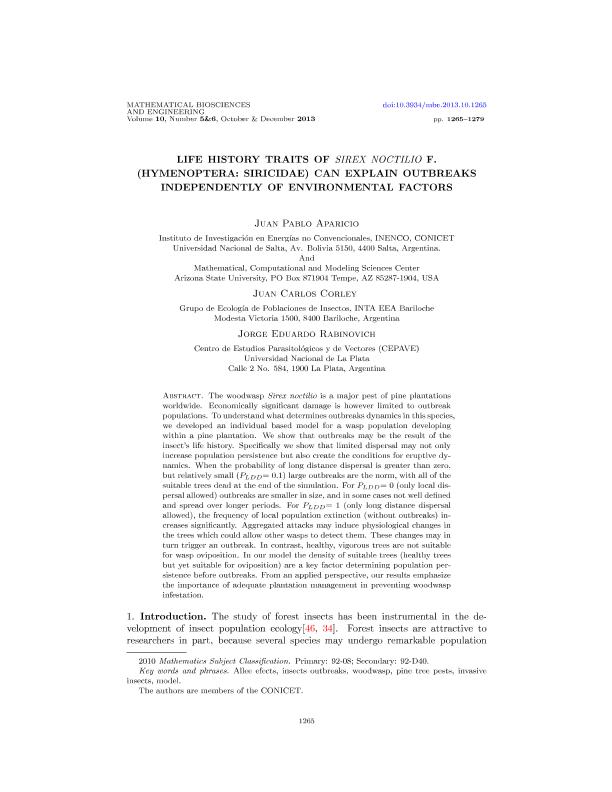Artículo
Life history traits of Sirex Noctilio f. (hymenoptera: siricidae) can explain outbreaks independently of environmental factors
Fecha de publicación:
08/2013
Editorial:
American Institute of Mathematical Sciences
Revista:
Mathematical Biosciences And Engineering
ISSN:
1551-0018
Idioma:
Inglés
Tipo de recurso:
Artículo publicado
Clasificación temática:
Resumen
The woodwasp Sirex noctilio is a major pest of pine plantations
worldwide. Economically significant damage is however limited to outbreak
populations. To understand what determines outbreaks dynamics in this species,
we developed an individual based model for a wasp population developing
within a pine plantation. We show that outbreaks may be the result of the
insect’s life history. Specifically we show that limited dispersal may not only
increase population persistence but also create the conditions for eruptive dynamics.
When the probability of long distance dispersal is greater than zero,
but relatively small (PLDD= 0.1) large outbreaks are the norm, with all of the
suitable trees dead at the end of the simulation. For PLDD= 0 (only local dispersal
allowed) outbreaks are smaller in size, and in some cases not well defined
and spread over longer periods. For PLDD= 1 (only long distance dispersal
allowed), the frequency of local population extinction (without outbreaks) increases
significantly. Aggregated attacks may induce physiological changes in
the trees which could allow other wasps to detect them. These changes may in
turn trigger an outbreak. In contrast, healthy, vigorous trees are not suitable
for wasp oviposition. In our model the density of suitable trees (healthy trees
but yet suitable for oviposition) are a key factor determining population persistence
before outbreaks. From an applied perspective, our results emphasize
the importance of adequate plantation management in preventing woodwasp
infestation.
Palabras clave:
Allee Efects
,
Pine Tree Pests
,
Woodwasp
,
Model
,
Insects Outbreaks
,
Invasive Insects
Archivos asociados
Licencia
Identificadores
Colecciones
Articulos(CCT - PATAGONIA NORTE)
Articulos de CTRO.CIENTIFICO TECNOL.CONICET - PATAGONIA NORTE
Articulos de CTRO.CIENTIFICO TECNOL.CONICET - PATAGONIA NORTE
Articulos(CEPAVE)
Articulos de CENTRO DE EST.PARASITOL.Y DE VECTORES (I)
Articulos de CENTRO DE EST.PARASITOL.Y DE VECTORES (I)
Articulos(INENCO)
Articulos de INST.DE INVEST.EN ENERGIA NO CONVENCIONAL
Articulos de INST.DE INVEST.EN ENERGIA NO CONVENCIONAL
Citación
Aparicio, Juan Pablo; Corley, Juan Carlos; Rabinovich, Jorge Eduardo; Life history traits of Sirex Noctilio f. (hymenoptera: siricidae) can explain outbreaks independently of environmental factors; American Institute of Mathematical Sciences; Mathematical Biosciences And Engineering; 10; 5-6; 8-2013; 1265-1279
Compartir
Altmétricas




